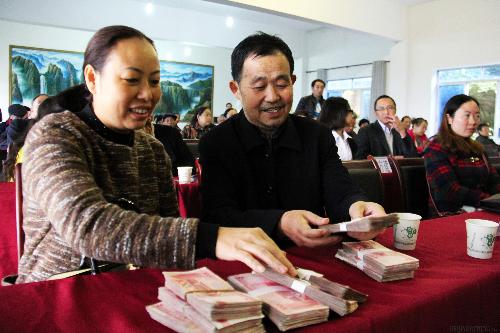|
 |
|
COMPENSATION IN FULL: Li Shunan, a resident in Luzhou City, southwest China's Sichuan Province, receives a refund for his medical bill on November 4 (CFP) |
Wang Jun, a senior economist with the China Center for International Economic Exchanges, said China is now facing mounting deflationary pressure.
"This tendency will continue into 2015 and it requires immediate responses from the Central Government in monetary policy. Combating deflation means China's prudent monetary policy should be fine-tuned to 'prudent' and yet lean toward 'loose'," Wang suggested.
"Cutting rates and lowering RRR should be alternately used next year to lift market sentiment," Wang suggested.
A recent report from Goldman Sachs also said although the basic tone for 2015 is still proactive fiscal policy and prudent monetary policy, the government stance won't be confined by those expressions, as evidenced by the recent interest rate cut in November.
Quicker pace of reform
One of the most fruitful developments of last year's Central Economic Work Conference was the decision to establish a central leading team for "comprehensively deepening reform" to spearhead reforms across all areas of society.
The team convened seven times in 2014, resulting in concrete progress in the areas of fiscal policy, the hukou (household registration) system, rural land transfers, the Shanghai free trade zone, anti-corruption efforts and judicial reform.
According to a statement released after this year's conference, China will accelerate reform in nine areas next year including the capital market and market access for private banks.
Reform will ideally speed up through administrative approval, investment, pricing, monopolies, franchising, government-purchased services and outbound investment. This takes into consideration both next year's needs and long-term interests.
More efforts will be made to transform the reform into growth. The evaluation system for reform and general public access to the reform work will also be improved.
"The fact that China has entered an economic new normal indicates the country should boldly roll out reforms in key areas so as to release the dividend of reforms and to unleash market vitality to shore up growth," said Liu Yuanchun, Vice Dean of the School of Economics at the Beijing-based Renmin University of China.
On November 30, China started soliciting public opinion on a draft regulation regarding the establishment of a deposit insurance program, which will be in full operation in six months or a year. The deposit insurance program is one important component of a safety net that protects financial stability. China has extensively discussed the setting up of such a program for years.
Guo Tianyong, a professor of banking at the Central University of Finance and Economics, said such a scheme is badly needed in China's market-oriented financial reform.
Zhu Ning, a professor of finance in Shanghai Jiao Tong University, said the implementation of deposit insurance will greatly expedite market-based interest rate reform in China.
"The lack of deposit insurance system has severely held back other financial reforms. After interest rates are full liberalized in China, the country's banking sector will witness real changes."
Another task high on China's economic agenda is to strengthen regional integration and promote trade by resurrecting an ancient trade route.
In a speech at Kazakhstan's Nazarbayev University in September 2013, President Xi proposed establishing a Silk Road Economic Belt, similar to the Silk Road of more than 2,000 years ago, to boost political and economic ties between China and Eurasian countries.
China has also been trying to revitalize an ancient seaway to promote economic ties with the ASEAN nations since October 2013 when Xi proposed the 21st Century Maritime Silk Road during a visit to Indonesia.
The initiatives aim at enhancing connectivity and trade ties with Central Asia and South Asia by building roads, railways, ports and airports across the two land masses. On November 8, China announced it would contribute $40 billion to set up a Silk Road infrastructure fund to boost connectivity across Asia.
"The two initiatives will be the most important mid- and long-term national strategies for China, in terms of China's major-country diplomacy, regional integration and industrial upgrade," said Guan Qingyou, Assistant Dean of Minsheng Securities Research Institute.
Zhang Yansheng, Secretary General of the Academic Committee of the NDRC, said China's labor- and resource-intensive industries can profoundly benefit from the construction of the Silk Road Economic Belt and the 21st Century Maritime Silk Road.
"It will help increase exports of products, equipment and laborers from China to countries along the proposed trade routes," Zhang said.
Email us at: zhouxiaoyan@bjreview.com
Major Tasks for 2015
Maintaining steady economic growth
Fostering new growth points
Upgrading agricultural production
Coordinating regional development
Strengthening social security network and improving people's quality of life
Eight Emphases for 2015
Fulfilling people's demand
Analyzing the consumption market and consumer psychology
Guiding societal expectations
Strengthening protection of property and intellectual property
Fully tapping into entrepreneurial talent
Improving education and increasing human resource competence
Improving the ecological environment
Advancing technology and innovation
| 